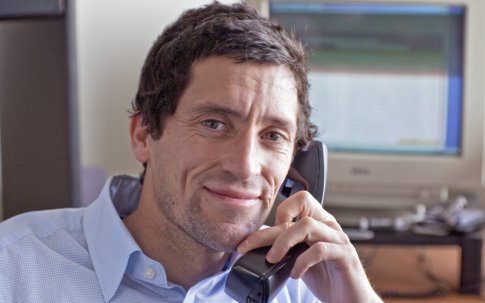(Photo credit CPR's Zachary Barr)
Today former soldiers are taking over the bunny slope at Vail. They’ve had devastating war injuries. And as part of their rehabilitation, they’re learning to ski. "We’ve been doing this program since 2004, and this is the most double leg amputees that we’ve ever had," says Cheryl Jenson. She founded the Vail Veterans Program. "Which just shows you the severity of their injuries, but also what’s happening on the ground in Afghanistan." This week’s group of about 20 veterans has eight men who’ve lost both legs. Colorado Public Radio’s Zachary Barr has this story of one of the skiers.
In November, Marine Mark Litynski was in Afghanistan. One moment his body was sound. Then he stepped on an explosive.
Litynski: Both legs were severed about halfway up the shin, and then because of infection and what not they ended up where they are now.
Where they are now is mostly gone. Both legs amputated above the knee. He also lost the lower half of his left arm. Litynski’s rehabbing at Walter Reed Army Medical Center in Washington D.C. He’s been there every single day since getting back. He hasn’t even returned home to Minnesota. Coming to Vail is his first trip outside of the hospital.
Knechtel: Step one. you are standing up on your own.
Geoff Knechtel is Litynski’s private ski instructor. Knechtel is in a wheelchair too. He uses the same kind of rig Litynski’s going to learn on.
Knechtel: Can you push forward towards me a bit, so we’re not on this hill.
The men sit in snug, bucket seats which ride a couple feet above the snow. Below the seat is a shock absorber and an aluminum frame -- and below that -- is a single ski.
Knechtel: Alright, step one conquered. Definitely. Are you tired yet?
Litynski: I haven’t done anything.
Knechtel: Why don’t we take five minutes.
The men lean on special ski poles to rest. They’re called outriggers. These poles have short skis on the ends to help with turning. Right now they’re being used like crutches, so one little slip-up and you’re going to crash.
Knechtel: first fall of the day!
Litynski: Getting started early.
Litynski’s helped up. A few minutes later he’s at the top of the beginner hill. His instructor gives some last minute advice.
Knechtel: When you’re looking down, you’re going to fall down. So your eyes are always going to be up. You’re always going to be looking at your destination. The bottom of the hill is your future.
Litynski: The same thing in therapy. the therapists always tell the guys don’t -- we have a tendency to look down because we’re concentrating on picking up one foot, and putting the other down. They always say keep your head up.
Litynski glides down the hill. He stays upright the whole time, and makes it to the bottom.
Knechtel: Alright how you feeling brother?
Litynski: Good except my arm is sweaty. And when my arm gets sweaty it kinda just wiggles around in the socket.
And that means Litynski can’t make his arm do what he wants it to do. At the bottom of the hill, his wife watches all of this. They’re newlyweds. This morning Heather anticipated this problem with Mark’s arm, so she put a lot of deodorant on it. It hasn’t worked.
Heather Litynski: If his socket was hanging on, he would be scouring these hills right now.
She hopes this trip will help her husband feel better about his future.
Heather Litynski: Help him transition and realize he’s still going to be able to do a lot of things. A little differently, but he’s still going to be able to do a lot of things.
But for today, Mark Litynski is focused on learning to ski. And he’s sticking with it. He manuevers his new body into position to ride up to the top of the hill again. Then he says:
Litynski: I wish I had my arm still. That’d nice right now.
Immediately, his ski instructor says, “why wish for things you can’t have?”
Zachary Barr, Colorado Public Radio News.
Many others have gone through the Vail Veterans Program. And a few have become really good skiers. Retired Marine Sergeant Chris Fesmire is one of them. He’s in Vail this week helping out the new guys. Fesmire’s also a vet, who lost both his legs. He tells Ryan Warner what it feels like to zoom down the hill on his mono-ski:









